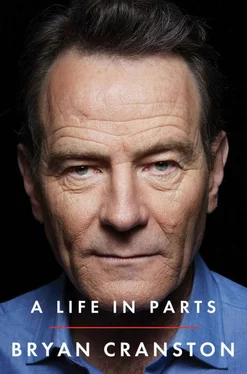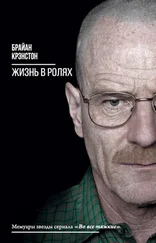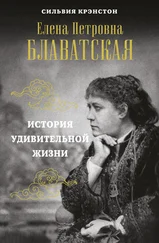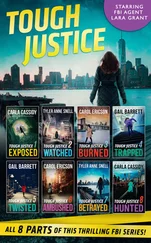Professor Flipnoodle was the lead role in our school play, The Time Machine ; Flipnoodle was the machine’s wacky inventor, who traveled back in time to seminal, teachable moments in history. Two years earlier, the school had done the same play, my brother in the lead role, and I was blown away by his ability. When Kim donned the character’s fire-red curly wig on the stage, he became a different person. I remember sitting in that audience and knowing with piercing clarity that I wanted to wear that wig, too. At last, my audition arrived. I can’t remember the details, but I must have been good. I got the role. The wig was mine.
Two performances were scheduled: one in the daytime for the student body and teachers, and one at night for the parents. I chipped away at the text and memorized it. I was confident that everything would fall into place. Doing a play was like an oral book report, just longer.
With the red curly wig as my talisman, I breezed through the afternoon performance, winning applause and cheers. During a break, a castmate and friend, Jeff Widener (a convincing Davey Crockett), shared an idea, a note he thought would be a funny addition to the evening performance.
“Hey, Bryan, wouldn’t it be funny if instead of saying, ‘After delivering the Gettysburg Address, President Lincoln will return to the White House,’ you said, ‘President Lincoln will return to the White Front.’ Wouldn’t that be funny?” In the sixties and seventies, a department store chain named the White Front was as ubiquitous in Southern California as Target is today. I laughed and agreed, sure, substituting White Front for White House would be funny. But saying that would ruin the play. My response was emphatic, serious. No. Conversation over.
But now I was paranoid. I couldn’t have been aware of the term mantra , and yet that’s what I employed. I hammered these words into my head with grim determination. Don’t say White Front, don’t say White Front.
Hours later, I got up on that stage and performed my heart out. This happened before my dad punched the guy in the courthouse, but I don’t remember him being in the auditorium. I knew my mother and brother and grandparents were out in the darkness, however, so I was filled with pride and adrenaline. I came to the part of the show dealing with the strife of the Civil War, and in a tone of supreme authority I pronounced that “after delivering the Gettysburg Address, President Lincoln will return to the White Front.”
Silence.
I realized what I’d done instantly and stopped. Did they hear it? Maybe they didn’t. Maybe God stepped in and corrected my word at the last second and saved me. I sheltered in the brief moment of silence and hope. But then came the laughter. The sound ricocheted off the walls and ceiling tiles like bullets. Men were doubled over in hysterics. Kids on stage were so overcome that snot was coming from their noses. Carolyn Kiesel was on stage, too, crying with laughter—which extinguished any hope of currying favor with her from my afternoon’s perfect performance.
Everything came to a standstill exept my breathing. I stood there panting. I felt numbness in my face. A few years before, I’d had some teeth pulled, and afterward, as the drugs wore off, the world trailed by me in slow motion. Speech was distorted, faces misshapen. On stage, at that moment, I was reliving that sensation. Plus panic. I messed up something bad. Real bad.
I looked backstage and there was my beloved Mrs. Waldo. She couldn’t contain herself, either. She was laughing so hard that she could barely muster the strength to wave her hand in a circle. She was signaling to me to continue the play. But I couldn’t. I was frozen.
I suppose it lasted only a couple of seconds, though it felt like an hour. Eventually the roar quieted to some softer laughter and tittering, and I sensed I could continue. But what to do next? Plow forward? Go back and correct my mistake? I decided on a do-over. I said the line again. As written: “After delivering the Gettysburg Address, President Lincoln will return to the White House.”
Suddenly the room was loud again with laughter. It was almost violent. The line now had a history, like a favorite joke; all you had to do was allude to it and people started to lose control.
I was no longer stunned. I was angry. I SAID IT CORRECTLY! I couldn’t understand why the audience wanted to continue to punish me. It felt mean. The meanness of it struck me to the core.
I thought about walking off the stage—but somehow I knew that would make things even worse. Eventually the room settled down enough to start again. Fool me once. This time I plucked out a line that came after the now charged, loaded words White House . I pushed through the play with a hasty but precise pace, imagining everyone anticipating my next mistake so they could have another good chuckle at my expense.
Finally, mercifully, it was over.
I was upset. I was inconsolable. The worst part was that I had to endure the throngs backstage thanking me for an evening they would not soon forget.
That night set me on a course for many years to come. I became introverted, unsure of myself. And one thing I knew for certain: performing was not for me.
Simon and Garfunkel’s “Mrs. Robinson” was trilling from the record player, and Carolyn Kiesel was just a few feet away, looking beyond pretty. Perfect.
She’d warmed up to me over the last year. Perhaps she’d even forgotten my Flipnoodle debacle. I’d stopped putting paste in her hair and learned to talk to her like a real person. And she’d responded. She was sweet and generous at an age when nerves and hormones often overruled those qualities. I thought maybe she even liked me. So I’d made a plan.
I fingered the Saint Christopher medal in my pocket. Saint Christopher was the patron saint of travelers and mariners, and many surfers strung the medals around their necks for protection against the rough seas. For us in Southern California, the medal was a symbol of a man and his desires. Back then you gave it to a girl when she agreed to go steady with you, and she wore it as a pendant. Mine was going to Carolyn.
It was a leap. I felt something between us, but what if I was wrong?
My dad was gone. The White Front night shone like a specter behind me. I was quiet and unremarkable and shy. Why would she want me?
I hesitated. I debated. I tried to summon my courage and confidence.
As I hovered over a bowl of chips in agonizing conversation with myself I only semi-understood what was happening as the new kid in school, a skateboard dude with blond wavy hair, ambled up to Carolyn. Where have you gone, Joe DiMaggio, a nation turns its lonely eyes to you. Woo woo woo. Suddenly, Skateboard Dude asked Carolyn if she wanted to go steady. She smiled. She said yes. Their faces moved together and they kissed. They… kissed . They kissed right before my eyes. Just a few feet from me. Hey hey hey.
They kissed as if I weren’t there.
Hey hey hey .
Most people in a divorce situation are forced to sell their houses in order to tabulate assets and divvy them up. We didn’t have that problem. The bank took our house. Banks do that when people stop paying their mortgages. Men came and put a large sticker outlined in bright red on our front door: a proclamation to our friends and neighbors, our community—a scarlet letter.
I saw the looks on our neighbors’ faces, somehow both judgmental and pitying. We were disgraced. Worse, we were forced to leave what comforts remained of our home. I had been under the impression all this time that we owned our house. I came to understand that the word own is often used loosely.
Читать дальше












